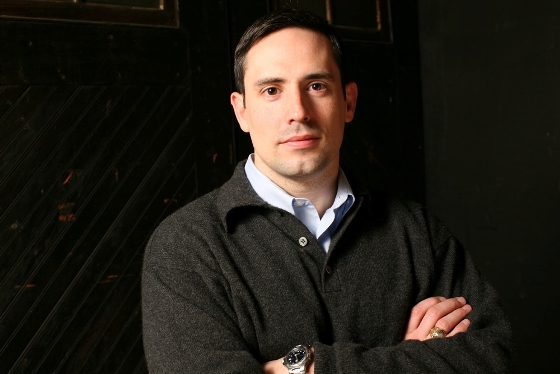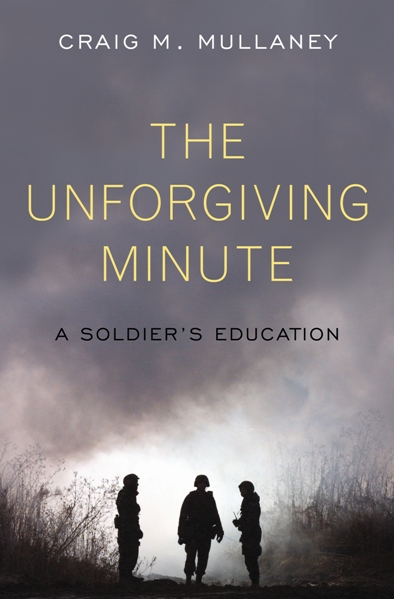
Craig Mullaney’s The Unforgiving Minute: A Soldier’s Education stands out among memoirs of Iraq and Afghanistan. Winning high praise from military men and book critics alike, The Unforgiving Minute is a coming-of-age tale about Mullaney’s journey from West Point to Oxford to the border between Afghanistan and Pakistan, where his service earned him a Bronze Star. Mullaney, who recently served as an adviser to the Barack Obama campaign, chats about his book, his service, and what all Americans should know about Afghanistan.
Q. The subtitle of your book is “a soldier’s education.” In what ways did your college education and graduate work help you on the battlefield?
A. West Point is really a school for training leaders, and everything they do there – from the classroom to the field exercises, the physical program to the character building – is all designed to help prepare you for when you graduate, for when you’re in command of a platoon of young men and women who are depending on you to make the best decisions under pressure. They continually put you in situations where you’re asked to exercise leadership in chaotic or confusing or stressful environments.
Graduate school prepared me in ways that I hadn’t expected. In many ways it’s a perfect complement to study at a military academy. West Point is very structured, very disciplined, whereas Oxford was totally open-ended. I went from having a schedule that was blocked out in fifteen-minute increments for 18 hours a day to a calendar that was blank. I had to take command of my education in a way that ultimately helped me as a leader arriving in Afghanistan, and having to make sense of a situation I didn’t understand without guidance.
 Q. What do you wish you’d known before you headed to Afghanistan?
Q. What do you wish you’d known before you headed to Afghanistan?
A. The first caveat is that the army of 2003 is very different than the army of 2009. Before we deployed I don’t think anyone recognized that we were fighting an insurgency in Afghanistan, and the army had to learn the hard way over the last six years how to fight in ways that are very different from what the field manual says. It’s much more about outreach to the local population, building up local government, and providing opportunities. It’s really a very indirect way of attacking your enemy. But you are depriving your enemy of access to the population whose support they need to survive. In 2003 we didn’t understand that.
On a very personal level, some things are very hard to train for. In no training exercise do you have real blood. When you see people hurt, wounded, killed, there’s very real psychological and emotional trauma to that, but you don’t have the luxury, in a combat environment, of stopping.
Q. What would you want all Americans to know about the realities of fighting in Afghanistan?
A. I think one of the common misperceptions is the myth of Afghans being resistant to outsiders. What history tells us is that Afghans are resistant to outsiders who seek to occupy and control them. The facts on the ground bare out a different relationship between Afghans and international forces today. Where international forces are strong and where the community feels protected by them, Afghans are overwhelmingly supportive. Where we’re not able to provide security because we’re too few in number, or overly reliant on air power and causing civilian casualties, they’re much less receptive. As we’re moving more forces into Afghanistan, I’m not overly concerned about creating an adverse reaction from the population. If anything it demonstrates our commitment to them and their security and well-being.
Q. You mentioned the history of Afghans resisting foreign forces. Were there any other lessons you learned in your study of history that your experience contradicted or bore out or elaborated?
A. One of the broader lessons of history that I’ve learned is that recognizing what you do not know is as important as recognizing what you do know. That spirit and mental framework spurs you to learn more about the given situation that you’re in, and to continually ask questions and reexamine assumptions. As a lieutenant on the ground, rethinking assumptions and adapting on the fly helps your troops get back home safely. As a strategist, and in my capacity as a policy advisor, it’s in many ways more important to continually reassess your strategy and the assumptions that underlie it.
Q. What was it like to serve in the Obama campaign – were there a lot of folks who had served in Iraq or Afghanistan, or no?
A. There were a handful of us. It was a small team advising Obama on the campaign staff. Four of us were veterans of Iraq or Afghanistan. I think it was something that President Obama, or Sen. Obama at the time, saw as critical – that there be voices of those who had been where the rubber meets the road, to add that texture and perspective to the discussion. He heard from many active military officers and sergeants and very intelligent strategic thinkers, and also from the muddy boots diplomats and soldiers who had seen up close what works and doesn’t work, to know what it feels like when you’re 7,000 miles away, and the policy screwdriver turns.
Q. You’ve said before that the best tactics in the world don’t matter if you have the strategy wrong. Are we getting it right in Afghanistan now, with the planned troop increase?
A. Increased troops per se don’t necessarily make the strategy. Security is an element of the strategy but it’s probably the least important. The most important thing to get right is ultimately the political contest between the Taliban and the legitimate government, by improving local government structure and providing better opportunities for the Afghans than what the Taliban can offer. That means a lot of economic development and education.
I think what’s most attractive in the plan is the emphasis on partnership between those in uniform and the civilian experts and diplomats working at the grassroots level, focused on the population.
Q. Your book has won a lot of praise as an essential voice from this war. Were you inspired by other war memoirs by those who fought in prior conflicts, or by your contemporaries?
A. As I wrote this book, I stayed away from reading other military memoirs because I really wanted to find my own voice. But as a student of history and literature, I’ve read widely, including certainly books that I greatly admire. I tried to approach their quality, as memoirs, of honesty and, as literature, of being unadorned. I wanted to write prose that you could bounce a quarter off. And it was hard work to make the story speak for itself.
I would cite as influences and models a number of World War I memoirs – Storm of Steel is one…Robert Graves’ Goodbye to All That, and the powerful but spare language of some of the poets of World War I. There’s a French poet, [Guillaume] Apollinaire. And from World War II, the humor of Catch-22, and Goodbye Darkness by William Manchester. There’s a number from Vietnam, like Tim O’Brien’s work, and Philip Caputo.
Q. When did you know you wanted to be a soldier?
A. That’s a great question because it’s slightly different than the decision to become a cadet. I think I wasn’t sure whether the path was still the right one for me until after I’d had my first leadership opportunity at West Point during the summer before my sophomore year. The satisfaction that I found in leading a team was unlike any experience I’d had as an individual, or as a member of a team – the challenge of motivating and building trust, of working toward a common goal, of inspiring, of recognizing how far personal example can go, and building a team in your image. There was also this concept of leadership as service downward. I served my squad rather than the other way around. There’s a saying in the army that officers eat last. Wherever you go in the field and they’re serving food, the officers go to the end of the line. That’s a recognition that you serve the soldier rather than the other way around.
Q. Americans seem somewhat disconnected from the war – few know any veterans or anyone on active duty, and the economic crisis has got everyone’s attention at home. Did you seek to change that sense of distance by writing this book?
A. I think as citizens we have an obligation not necessarily to serve in uniform but to understand what we ask of those who do serve. I think there’s also an obligation to ask the hard questions of our leaders. The consequences are significant for those who’ve volunteered to serve their country. I hoped with my book, purposefully written in as an accessible a way as possible, to allow people to walk a mile in our boots, to put them under my helmet, to see and feel and taste and cry and smile and laugh, and to understand at the end the military is not so different. It’s not “them.” It’s us. It’s our neighbors. Each of my soldiers is someone’s brother, son, father.
*Photo courtesy Penguin Press.




Send A Letter To the Editors